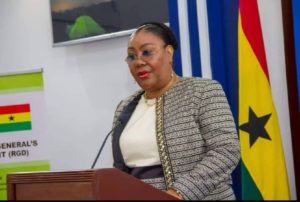Technology, funding setbacks said to hinder Ghana’s Beneficial Ownership regime

Mrs Jemima Oware, Registrar, Office of the Registrar of Companies, (ORC), says Ghana’s Beneficial Ownership (BO) implementation journey has been marred with challenges despite progress in the setting up of the legal framework for implementation.
“Funding, verification, software challenges and maintenance of systems are some challenges, but we continue to build an excellent system to support BO disclosure.”
Mrs Oware was speaking at the opening of a two-day peer exchange on BO transparency between the ORC Ghana and Corporate Affairs Commission, (CAC) Nigeria, in Accra.
The Peer Exchange was to share current state of BO in both countries, learn best practices and experiences, discuss challenges and create an avenue for collaboration between the two countries to have an effective BO in the sub region.
The Registrar-General’s Department (RGD) in March last year introduced the Beneficial Ownership (BO) Transparency Regime as part of the Company Registration processes under the Companies Act 2019 (Act 992) with the aim of ensuring companies knew who they were transacting business with.
A Beneficial Owner (or Owners) is the individual or natural person who owns, controls, and has interest in, or exercises influence over the legal person (or arrangement) or receives substantial benefit from its activities. A beneficial owner is an individual and should not be a Company.
Mrs Oware said Ghana through its new ORC, which has oversight over the implementation of the BO has made various commitments to, but the highest form of commitment came from government by providing all the leadership and funding.
She said before its implementation, it became clear that Ghana required a legal framework to implement the BO disclosure and so there was an amendment of the Company Act of 1973, Act 179 to include the BO provision.
She said the company’s Amendment Act of 2016, Act 922 was enacted, but the transition from the law to its implementation became a challenge.
“During the enactment we collaborated with a lot of companies assisted by technical experts, several stakeholder consultations were also held to determine the appropriate threshold levels.”
“BO is a new territory for us, and we continue to discover new learning curves as we go ahead because the BO disclosure regime is still a developing and evolving one, the opportunity to share ideas perspective and challenges and how to surmount this challenge to ultimately lend support to each other Is still ongoing.”
She noted that they were coming up with an entirely new software to take care of some of the challenges identified and expressed the hope that at the end of the exchange both countries would be sufficiently armed with useful information and best practices that could be used to advance BO disclosure implementation.
Alhaji Gariba Abubakar, Registrar, CAC, Nigeria said in Nigeria their journey started in 2020, when their old Company’s Law was repealed, and a new one reenacted and implementation started in January last year.
He said, “at the time the commitment was made there was no legal framework that provided for mandatory disclosure of beneficiary owners of companies. so, we started by changing our laws because BO deals with companies and the first attempt was to amend Companies and Allied Matters Act and this was done in August 2020.”
He said in Nigeria the new framework provides for mandatory disclosures so information on BO is publicly available, but “We verify to ensure those that claims to be the beneficiaries are the right people.”
“We need to create a balance, so we have integrated with the biometric data base of our National Identity Management Authority, so that anybody applying to register a company, their information is validated from that platform before the company is registered.”
Alhaji Abubakar said, “we strive to achieve this standard, we are hoping that there will be a global consensus on the best approach to adopt on this. Some countries are yet to meet the old standards and yet we have changed to a new standard. The conversation around which standard to use, the timeline for compliance has to be addressed otherwise people would get fed-up because a lot has been done already.”
Mr Keith McMahon, Deputy British High Commissioner to Ghana, noted that issues of finance was transnational and the UK, Ghana and Nigeria were all vulnerable to financial systems they had used, hence they needed to come together to solve it by sharing and learning from each other’s experience on how to address financial issues.
“We can help you to address the issue of threats, but issues of finance are transnational and so we need to work transnationally to be able to solve these threats,” he added.
Source: GNA
